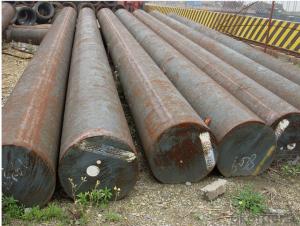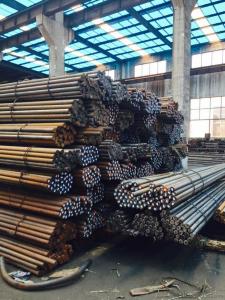Special Steel 1.2631 Round Steel / A8 Tool Steel Round Bar
- Loading Port:
- China main port
- Payment Terms:
- TT or LC
- Min Order Qty:
- 25 m.t.
- Supply Capability:
- 10000 m.t./month
OKorder Service Pledge
OKorder Financial Service
You Might Also Like
Item specifice
The details of our Steel
1. Produce Standard: as the GB, AISI, ASTM, SAE, EN, BS, DIN, JIS Industry Standard
2. Produce processes: Smelt Iron -EAF smelt Billet - ESR smelt Billet -Hot rolled or forged get the steel round bar and plate
3. Heat treatment:
Normalized / Annealed / Quenched+Tempered
4. Quality assurance:
All order we can received Third party inspection, You can let SGS, BV,.. and others test company test and inspect our products before Goods shipping.
Product information
Chemical Composition(%) of A8 steel round bar | C | Si | Mn | S | P | Cr | Mo | V |
0.90-1.05 | 0.20-0.40 | 0.40-0.70 | ≤0.035 | ≤0.035 | 4.80-5.50 | 0.90-1.20 | 0.10-0.30 | |
Specification of A8 steel round bar | Dia.*L=14~50mm*2000~5000mm | |||||||
Characteristic of A8 steel round bar | 1.good machinability and abrasivity 2.good hardness | |||||||
Application of A8 A8 steel round bar | 1.Precision Stamping Dies 2.Precison Blanking Dies of wire cutting process, and stamping dies for various uses 3.Tools for plactic deformation of hard processing material 4.Dies for forging, deep drawing and thread rolling 5.High speed blanking punch,stainless plates punch 6.Tensile modulus, crimping die, embossing dies, wear plastic molding mold | |||||||
Heart Treatment of A8 steel round bar | 1.Quench: 940-960°c oil cooling 2.Tempering temperature: 210~240 °C 3. Hardness: 61HRC | |||||||
Melting Process of A8 steel round bar | 1. EAF: Electric Furnace+LF+VD(Optional) 2. ESR: Electric Furnace+LF+VD+Eleroslag Remelted(Optional) | |||||||
Payment Term of A8 steel round bar | L/C or T/T, 30% in advance, 70% before the shipment | |||||||
Main product
Plastic Mould Steel
DIN 1.2311,1.2738,1.2083,1.2316 etc.
AISI P20,P20+Ni,420 etc.
JIS SUS420J2
Hot Work Steel
DIN 1.2344,1.2343,1.2367,1.2365,1.2581,1.2713 etc.
AISI H13,H11,H10,H21, etc.
JIS SKD61,SKD6,SKD5,SKT4 etc.
Cold Work Steel
DIN 1.2739, 1.2601, 1.2080, 1.2436, 1.2631, 1.263, 1.2510, 1.2327 etc.
AISI D2, D5, D3, D6, A8, A2, O1 etc.
JIS SKD10, SKD11, SKD1, SKS3 etc.
High Speed Steel
DIN 1.3343, 1.3243, 1.3247, 1.3355 etc.
AISI M2, M35, M42, T1 etc.
JIS SKH51, SKH35, SKH59, SKH2 etc.
Alloy Structural Steel
DIN 1.7035,1.6511,1.7220,1.7225 etc.
AISI 5140, 4340, 4135, 4140 etc.
JIS SCr440,SNCM439,SCM435,SCM440 etc.
Stainless & Carbon Steel or Others
DIN 1.4125,1.1191 etc
AISI 440C,1045, 1020 etc.
JIS SUS440C,S45C etc
Product show

Workshop show

Shipping
1. FedEx/DHL/UPS/TNT for samples, Door-to-Door;
2. By Air or by Sea for batch goods, for FCL; Airport/ Port receiving;
3. Customers specifying freight forwarders or negotiable shipping methods!
Delivery Time: 3-7 days for samples; 5-25 days for batch goods.
Payment Terms
1.Payment: T/T, L/C, Western Union, MoneyGram,PayPal; 30% deposits; 70% balance before delivery.
2.MOQ: 1pcs
3.Warranty : 3 years
4.Package Informations: 1) EXPORT, In 20 feet (GW 25 ton) or 40 feet Container (GW 25 ton)
2)as customer's requirement
Why choose us?
(1) The leading exporter in China special steel industry.
(2) Large stocks for various sizes, fast delivery date.
(3) Good business relationship with China famous factories.
(4) More than 7 years steel exporting experience.
(5) Good after-sales service guarantee.
- Q:How is case-hardening steel used in the production of gears and camshafts?
- Case-hardening steel is used in the production of gears and camshafts to enhance their surface hardness and wear resistance. The process involves heating the steel at a high temperature and then rapidly cooling it, creating a hardened outer layer while maintaining a tough core. This hard outer layer allows gears and camshafts to withstand the high stresses and wear they experience during operation, increasing their durability and lifespan.
- Q:How is special steel classified?
- Special steel is classified based on its chemical composition, mechanical properties, and intended applications. It can be categorized into various types such as carbon steel, alloy steel, stainless steel, tool steel, and high-speed steel. These classifications help determine the steel's suitability for specific industrial uses and ensure its quality and performance.
- Q:Can special steel be used in the nuclear industry?
- Indeed, the nuclear industry finds special steel to be a valuable asset. This type of steel, also referred to as stainless steel, is commonly utilized in nuclear power plants due to its exceptional resistance to corrosion, impressive strength, and capability to endure high temperatures. Given the demanding conditions of nuclear reactors, which involve radiation exposure, high-pressure and high-temperature environments, as well as corrosive substances, the nuclear industry necessitates materials that can withstand such harsh circumstances. Special steel possesses properties that render it suitable for these conditions, including its corrosion resistance and ability to maintain mechanical properties at elevated temperatures. Furthermore, special steel plays a crucial role in the construction of nuclear fuel rods, storage containers, and other vital components. It is crucial to emphasize that the special steel employed in the nuclear industry is subject to rigorous quality control measures and testing in order to ensure its reliability and safety.
- Q:What is the process of manufacturing special steel?
- To produce high-quality and durable special steel with specific properties, several steps must be taken in the manufacturing process. Firstly, the raw materials needed for special steel production, such as iron ore, coal, chromium, nickel, and manganese, are selected meticulously based on the desired properties of the final product. Once the raw materials have been chosen, they are melted in large furnaces, either through the use of electric arc furnaces or basic oxygen furnaces. These furnaces subject the raw materials to extremely high temperatures, transforming them into molten metal. After the raw materials have been melted, the molten metal undergoes a refining process to eliminate any impurities. Techniques such as degassing, desulphurization, and deoxidation are employed to ensure that the steel is free from unwanted elements that could have a negative impact on its properties. Next, alloying elements are added to the molten metal after the refining process to achieve the desired properties. The proportion and specific alloying elements utilized depend on the intended application of the special steel. The molten steel is then poured into a continuous casting machine, which solidifies it into semi-finished products known as billets, blooms, or slabs. This continuous casting process guarantees a consistent and uniform structure throughout the steel. The semi-finished products are reheated and passed through a series of hot rolling mills. This process involves reducing the thickness and shaping the steel into various forms, including bars, rods, plates, or sheets, depending on the intended use. Following hot rolling, the steel may undergo heat treatment processes like annealing, quenching, tempering, or case hardening. These treatments further enhance the mechanical properties of the steel, such as its hardness, toughness, and ductility. The final step involves surface finishing and quality control measures. The steel is thoroughly inspected for any defects or imperfections that may have occurred during the manufacturing process. Surface treatments like pickling or galvanizing can also be applied to enhance the steel's appearance and protect it from corrosion. In conclusion, manufacturing special steel is a complex and precise operation that involves careful selection of raw materials, melting, refining, alloying, continuous casting, hot rolling, heat treatment, and finishing. These steps ensure that the resulting steel meets the specific requirements and performance characteristics demanded by various industries.
- Q:What is the impact of grain size on the mechanical properties of special steel?
- The impact of grain size on the mechanical properties of special steel is significant. Generally, a finer grain size enhances the strength, hardness, and toughness of the steel, while a coarser grain size can result in reduced mechanical properties. This is because a finer grain size provides more grain boundaries, which act as barriers to dislocation movement and contribute to strengthening the material. Additionally, finer grains promote better uniformity in the distribution of stress and strain, leading to improved mechanical performance. Therefore, controlling and optimizing the grain size is crucial in achieving the desired mechanical properties of special steel.
- Q:How does special steel contribute to reducing material waste?
- Special steel contributes to reducing material waste through its superior properties and durability. Unlike traditional steel, special steel is designed to have enhanced strength, corrosion resistance, and wear resistance. These properties allow for the production of thinner and lighter components without compromising their functionality, leading to reduced material consumption. Additionally, the longevity and resistance to wear of special steel products result in longer service life, minimizing the need for frequent replacements and further reducing material waste.
- Q:Can special steel be used in the packaging industry?
- Yes, special steel can be used in the packaging industry. Special steel alloys, such as stainless steel, offer excellent durability, corrosion resistance, and strength, making them suitable for manufacturing packaging materials and machinery. They are commonly used in producing containers, drums, cans, and machinery components for packaging applications.
- Q:How does stainless steel contribute to the construction industry?
- Stainless steel contributes to the construction industry by providing durability, corrosion resistance, and aesthetic appeal. It is widely used in structural applications, such as building facades, bridges, and roofing, as it can withstand harsh weather conditions and maintain its strength over time. Stainless steel's resistance to corrosion also makes it a suitable choice for plumbing, electrical, and HVAC systems, ensuring longevity and minimizing maintenance. Additionally, its sleek and modern appearance enhances the overall aesthetics of architectural designs.
- Q:How does special steel perform in surface hardening applications?
- Special steel performs exceptionally well in surface hardening applications. Due to its unique composition and properties, it can undergo various surface hardening processes like carburizing or nitriding, resulting in enhanced surface hardness, wear resistance, and overall durability. This makes special steel an ideal choice for applications where high strength and improved surface properties are required, such as in automotive components, cutting tools, or industrial machinery.
- Q:Can special steel be used in the production of cutting tools?
- Yes, special steel can be used in the production of cutting tools. Special steel, also known as tool steel, is specifically designed and manufactured for the purpose of making cutting tools. It possesses superior hardness, strength, and wear resistance, which are essential qualities for effective cutting and shaping applications. Special steel allows for the production of durable and high-performance cutting tools that can withstand the demands of various industries such as manufacturing, construction, and automotive.
1. Manufacturer Overview |
|
|---|---|
| Location | |
| Year Established | |
| Annual Output Value | |
| Main Markets | |
| Company Certifications | |
2. Manufacturer Certificates |
|
|---|---|
| a) Certification Name | |
| Range | |
| Reference | |
| Validity Period | |
3. Manufacturer Capability |
|
|---|---|
| a)Trade Capacity | |
| Nearest Port | |
| Export Percentage | |
| No.of Employees in Trade Department | |
| Language Spoken: | |
| b)Factory Information | |
| Factory Size: | |
| No. of Production Lines | |
| Contract Manufacturing | |
| Product Price Range | |
Send your message to us
Special Steel 1.2631 Round Steel / A8 Tool Steel Round Bar
- Loading Port:
- China main port
- Payment Terms:
- TT or LC
- Min Order Qty:
- 25 m.t.
- Supply Capability:
- 10000 m.t./month
OKorder Service Pledge
OKorder Financial Service
Similar products
New products
Hot products
Hot Searches
Related keywords





























